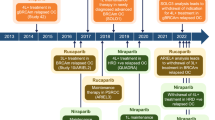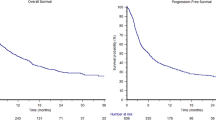Abstract
Purpose
To assess the maximum tolerated dose, safety, and pharmacokinetic (PK) profile of escalating doses of the novel topoisomerase I (topo I) inhibitor edotecarin (J-107088) given as a 2-h intravenous (IV) infusion once every 21 days in patients with advanced solid tumors who had not responded to standard therapy.
Patients and methods
Twenty-nine patients (18M:11F) received a 2-h IV infusion of edotecarin in doses of 6, 8, 11, 13, or 15 mg/m2 every 21 days (with an additional 1–2 weeks permitted for recovery) and were evaluated for safety, PK, and tumor response.
Results
The most common non-hematologic toxicities were grade 1–2 nausea, fatigue, anorexia, vomiting, and fever. The most common hematologic toxicities were grade 1–2 thrombocytopenia and grade 3–4 neutropenia, leukopenia, and anemia. No grade 3–4 diarrhea was reported. Dose-limiting toxicities were observed in four patients at the 15 mg/m2 dose and one patient at the 13 mg/m2 dose. These toxicities included grade 3 nausea, vomiting, headache, and fatigue, as well as grade 4 neutropenia and febrile neutropenia. The maximum tolerated dose was declared at 15 mg/m2. One patient with bladder cancer had a confirmed partial response at a dose of 13 mg/m2. There was a trend to dose-proportional increases in edotecarin peak plasma concentrations and area under the curve values. Renal excretion of edotecarin was minimal (3–8% of the dose).
Conclusion
The recommended Phase II dose of edotecarin is 13 mg/m2 once every 21 days. The toxicities in this study were those typical of cytotoxic chemotherapy and less severe than those associated with other topo I inhibitors. The observed safety profile and preliminary evidence of clinical benefit warrant further investigation of this drug as monotherapy or part of combination therapy in patients with solid tumors.

Similar content being viewed by others
References
Rougier P, Van Cutsem E, Bajetta E, et al. (1998) Randomised trial of irinotecan versus fluorouracil by continuous infusion after fluorouracil failure in patients with metastatic colorectal cancer. Lancet 352:1407–1412
Cunningham D, Pyrhonen S, James RD, et al. (1998) Randomised trial of irinotecan plus supportive care versus supportive care alone after fluorouracil failure for patients with metastatic colorectal cancer. Lancet 352:1413–1418
Saltz LB, Cox JV, Blanke C, et al. (2000) Irinotecan Study Group: Irinotecan plus fluorouracil and leucovorin for metastatic colorectal cancer. N Engl J Med 343:905–914
Douillard JY, Cunningham D, Roth AD, et al. (2000) Irinotecan combined with fluorouracil compared with fluorouracil alone as first-line treatment for metastatic colorectal cancer: a multicentre randomized trial. Lancet 355:1041–1047
Huinink WTB, Gore M, et al. (1997) Topotecan versus paclitaxel for the treatment of recurrent epithelial ovarian cancer. J Clin Oncol 15:2183–2193
Scheller JH, Kim K, Hutson P, et al. (1996) Phase II study of topotecan in patients with extensive-stage small-cell carcinoma of the lung: an Eastern Cooperative Oncology Group Trial. J Clin Oncol 14:2345–2352
Ardizzoni A, Hansen H, Bombemoswky P, et al. (1997) Topotecan, a new active drug in the second-line treatment of small-cell lung cancer: a Phase II study in patients with refractory and sensitive disease. J Clin Oncol 15:2090–2096
Bailly C (2000) Topoisomerase I poisons and suppressors as anticancer drugs. Current Med Chem 7:39–58
Long BH, Balasubramanian BN (2000) Non-camptothecin topoisomerase I compounds as potential anticancer agents. Exp Opin Ther Patents 10:635–666
Yoshinari T, Ohkubo M, Fukasawa K, et al. (1999) Mode of action of a new indolocarbazole anticancer agent, J-107088, targeting topoisomerase I. Cancer Res 59:4271–4275
Arakawa H, Morita M, Kodera T, et al. (1999) In vivo anti-tumor activity of a novel indolocarbazole compound, J-107088, on murine and human tumors transplanted into mice. Jpn J Canc Res 90:1163–1170
Arakawa H, Iguchi T, Morita M, et al. (1995) Novel antitumor indolocarbazole compound 6-N-formylamino-12,13-dihydro-1,11-dihydroxy-13-(β-D-glucopyranosyl) 5H-indolo[2,3-a]pyrrolo[3,4-c]carbazole-5,7-(6H)-dione(NB-506): Its potent antitumor activity in mice. Cancer Res 55:1316–1320
Komatani H, Kotani H, Hara Y, et al. (2001) Identification of breast cancer resistance protein/mitoxantrone resistance/placenta-specific, ATP-binding cassette transporter as a transporter of NB-506 and J-107088, topoisomerase I inhibitors with an indolocarbazole structure. Cancer Res 61:2827–2832
Declaration of Helsinki (2001) Recommendations guiding medical physicians in biomedical research involving human subjects. Republic of South Africa Revision
International Conference on Harmonization (ICH) (1996) Guideline for Good Clinical Practice. As part of the ICH Harmonized Tripartite Guideline (European Union, Japan and USA)
Gibaldi M, Perrier D (1982) Pharmacokinetics. 2nd edn. Marcel Dekker, New York
Yamada Y, Tamura T, Yamamoto N, et al. (2006) Phase I and pharmacokinetic study of edotecarin, a novel topoisomerase I inhibitor, administered once every 3 weeks in patients with solid tumors. Cancer Chemother Pharmacol 58:173–182
Camptosar US prescribing information: http://www.pfizeroncology.com/hcp/camptosar_resources.aspx
Acknowledgment
This study was sponsored by Banyu Pharmaceutical Co. Ltd.
Author information
Authors and Affiliations
Corresponding author
Rights and permissions
About this article
Cite this article
Hurwitz, H.I., Cohen, R.B., McGovren, J.P. et al. A phase I study of the safety and pharmacokinetics of edotecarin (J-107088), a novel topoisomerase I inhibitor, in patients with advanced solid tumors. Cancer Chemother Pharmacol 59, 139–147 (2007). https://doi.org/10.1007/s00280-006-0267-9
Received:
Accepted:
Published:
Issue Date:
DOI: https://doi.org/10.1007/s00280-006-0267-9




